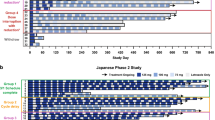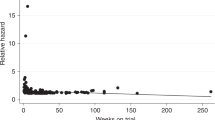Abstract
Purpose
Neutropenia is the most common toxicity of CDK4/6 inhibitors, causing frequent dose interruptions. However, CDK4/6 inhibitor-induced neutropenia shows a benign clinical course in contrast to that caused by chemotherapy. Here, we investigated the safety of a new dose scheme for palbociclib, which avoids dose delays or reductions due to afebrile grade 3 neutropenia.
Methods
A consecutive cohort of ER( +)/HER2( −) advanced breast cancer patients who received palbociclib between 2017 and 2018 was analyzed. The patients were classified into Group 1 (patients who maintained palbociclib dose with afebrile grade 3 neutropenia), Group 2 (patients who experienced any dose modification with afebrile grade 3 neutropenia), and Group 3 (patients without afebrile grade 3 neutropenia). The primary endpoint was febrile neutropenia incidence; other toxicities were compared with those of the PALOMA-2 trial.
Results
Among the 107 patients, 54.2%, 22.4%, and 23.4% were classified into Groups 1, 2, and 3, respectively. There was no febrile neutropenia in Groups 1 and 2 during palbociclib treatment. Group 1 showed higher incidence of thrombocytopenia (all-grade, 32.8%; grade 3–4, 8.6%) than Group 2 and the PALOMA-2 data, but there was no bleeding related to thrombocytopenia. Group 1 showed higher incidence of all-grade non-hematologic adverse events than Group 2; only one grade 3 non-hematologic toxicity was observed in Group 1. There were no treatment-related hospitalizations or deaths in Group 1.
Conclusions
Thus, omitting palbociclib dose modification with afebrile grade 3 neutropenia is safe and tolerable without febrile neutropenia events. This scheme could be useful to avoid unnecessary reductions in palbociclib doses in future practice.


Similar content being viewed by others
Change history
14 July 2020
In the original publication of the article, under the Results section, subheading ���Patient survival���, the second sentence that reads as ���The 6-month PFS was 92.4%, 81.8%, and 93.3% and the one-year PFS was 72.0%, 88.9%, and 78.9% in Groups 1���3, respectively.��� should read as "The 6-month PFS was 82.8%, 75.0%, and 68.0% and the one-year PFS was 77.0%, 62.0%, and 63.8% in Groups 1���3, respectively.".
References
O'Leary B, Finn RS, Turner NC (2016) Treating cancer with selective CDK4/6 inhibitors. Nat Rev Clin Oncol 13(7):417–430. https://doi.org/10.1038/nrclinonc.2016.26
Finn RS, Martin M, Rugo HS et al (2016) Palbociclib and Letrozole in Advanced Breast Cancer. N Engl J Med 375(20):1925–1936. https://doi.org/10.1056/NEJMoa1607303
Verma S, Bartlett CH, Schnell P et al (2016) Palbociclib in combination with fulvestrant in women with hormone receptor-positive/her2-negative advanced metastatic breast cancer: detailed safety analysis from a multicenter, randomized, placebo-controlled, phase III study (PALOMA-3). Oncologist 21(10):1165–1175. https://doi.org/10.1634/theoncologist.2016-0097
Im SA, Lu YS, Bardia A et al (2019) Overall survival with ribociclib plus endocrine therapy in breast cancer. N Engl J Med 381(4):307–316. https://doi.org/10.1056/NEJMoa1903765
Goetz MP, Toi M, Campone M et al (2017) MONARCH 3: abemaciclib as initial therapy for advanced breast cancer. J Clin Oncol 35(32):3638–3646. https://doi.org/10.1200/JCO.2017.75.6155
Giuliano M, Schettini F, Rognoni C et al (2019) Endocrine treatment versus chemotherapy in postmenopausal women with hormone receptor-positive, HER2-negative, metastatic breast cancer: a systematic review and network meta-analysis. Lancet Oncol 20(10):1360–1369. https://doi.org/10.1016/S1470-2045(19)30420-6
Thill M, Schmidt M (2018) Management of adverse events during cyclin-dependent kinase 4/6 (CDK4/6) inhibitor-based treatment in breast cancer. Ther Adv Med Oncol 10:1758835918793326. https://doi.org/10.1177/1758835918793326
Im SA, Mukai H, Park IH et al (2019) Palbociclib plus letrozole as first-line therapy in postmenopausal asian women with metastatic breast cancer: results from the phase III, randomized PALOMA-2 study. J Glob Oncol 5:1–19. https://doi.org/10.1200/JGO.18.00173
Hu W, Sung T, Jessen BA et al (2016) Mechanistic investigation of bone marrow suppression associated with palbociclib and its differentiation from cytotoxic chemotherapies. Clin Cancer Res 22(8):2000–2008. https://doi.org/10.1158/1078-0432.Ccr-15-1421
Mayer EL, DeMichele A, Rugo HS et al (2019) A phase II feasibility study of palbociclib in combination with adjuvant endocrine therapy for hormone receptor-positive invasive breast carcinoma. Ann Oncol 30(9):1514–1520. https://doi.org/10.1093/annonc/mdz198
Watson GA, Deac O, Aslam R et al (2019) Real-world experience of palbociclib-induced adverse events and compliance with complete blood count monitoring in women with hormone receptor-positive/her2-negative metastatic breast cancer. Clin Breast Cancer 19(1):e186–e194. https://doi.org/10.1016/j.clbc.2018.09.002
Spring LM, Zangardi ML, Moy B et al (2017) Clinical management of potential toxicities and drug interactions related to cyclin-dependent kinase 4/6 inhibitors in breast cancer: practical considerations and recommendations. Oncologist 22(9):1039–1048. https://doi.org/10.1634/theoncologist.2017-0142
Cardoso F, Senkus E, Costa A et al (2018) 4th ESO-ESMO international consensus guidelines for advanced breast cancer (ABC 4)dagger. Ann Oncol 29(8):1634–1657. https://doi.org/10.1093/annonc/mdy192
Mayer E, DeMichele A, Dubsky P et al (2016) Abstract OT1–03–21: PALLAS: PAlbociclib Collaborative Adjuvant Study: A randomized phase 3 trial of palbociclib with adjuvant endocrine therapy versus endocrine therapy alone for HR+/HER2-early breast cancer. AACR
Mansinho A, Boni V, Miguel M et al (2019) New designs in early clinical drug development. Ann Oncol 30(9):1460–1465. https://doi.org/10.1093/annonc/mdz191
Di Leo A, Jerusalem G, Petruzelka L et al (2010) Results of the CONFIRM phase III trial comparing fulvestrant 250 mg with fulvestrant 500 mg in postmenopausal women with estrogen receptor-positive advanced breast cancer. J Clin Oncol 28(30):4594–4600. https://doi.org/10.1200/JCO.2010.28.8415
Najjar YG, Mittal K, Elson P et al (2014) A 2 weeks on and 1 week off schedule of sunitinib is associated with decreased toxicity in metastatic renal cell carcinoma. Eur J Cancer 50(6):1084–1089. https://doi.org/10.1016/j.ejca.2014.01.025
Arnold A, Papanikolaou A (2005) Cyclin D1 in breast cancer pathogenesis. J Clin Oncol 23(18):4215–4224. https://doi.org/10.1200/JCO.2005.05.064
Yu Q, Sicinska E, Geng Y et al (2006) Requirement for CDK4 kinase function in breast cancer. Cancer Cell 9(1):23–32. https://doi.org/10.1016/j.ccr.2005.12.012
Finn RS, Dering J, Conklin D et al (2009) PD 0332991, a selective cyclin D kinase 4/6 inhibitor, preferentially inhibits proliferation of luminal estrogen receptor-positive human breast cancer cell lines in vitro. Breast Cancer Res 11(5):R77. https://doi.org/10.1186/bcr2419
Scheicher R, Hoelbl-Kovacic A, Bellutti F et al (2015) CDK6 as a key regulator of hematopoietic and leukemic stem cell activation. Blood 125(1):90–101. https://doi.org/10.1182/blood-2014-06-584417
Hu MG, Deshpande A, Schlichting N et al (2011) CDK6 kinase activity is required for thymocyte development. Blood 117(23):6120–6131. https://doi.org/10.1182/blood-2010-08-300517
Hortobagyi GN, Stemmer SM, Burris HA et al (2016) Ribociclib as First-Line Therapy for HR-Positive, Advanced Breast Cancer. N Engl J Med 375(18):1738–1748. https://doi.org/10.1056/NEJMoa1609709
Funding
This research was supported by a grant from the Korea Health Technology R&D Project through the Korea Health Industry Development Institute (KHIDI), funded by the Ministry of Health & Welfare, Republic of Korea (Grant Number: HI19C0430).
Author information
Authors and Affiliations
Corresponding author
Ethics declarations
Conflicts of interest
The authors declare that they have no conflict of interest.
Ethical approval
This study was approved by the Institutional Review Board of Severance Hospital. All procedures performed in this study were in accordance with the ethical standards of the Institutional Review Board and with the 1964 Helsinki declaration.
Informed consent
Informed consent was waived because this study is a retrospective medical chart review that has minimal level of risk.
Additional information
Publisher's Note
Springer Nature remains neutral with regard to jurisdictional claims in published maps and institutional affiliations.
Electronic supplementary material
Below is the link to the electronic supplementary material.
Rights and permissions
About this article
Cite this article
Ham, A., Kim, M.H., Kim, G.M. et al. Palbociclib use with grade 3 neutropenia in hormone receptor-positive metastatic breast cancer. Breast Cancer Res Treat 183, 107–116 (2020). https://doi.org/10.1007/s10549-020-05750-y
Received:
Accepted:
Published:
Issue Date:
DOI: https://doi.org/10.1007/s10549-020-05750-y




